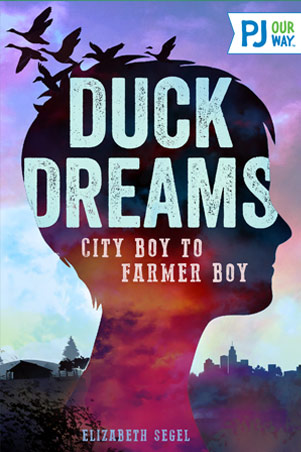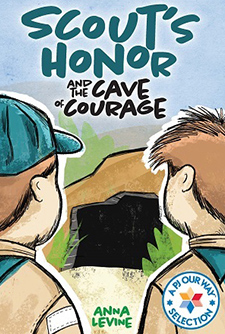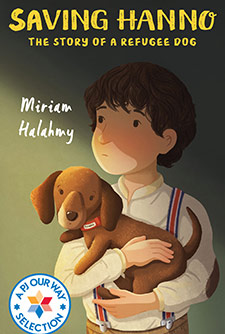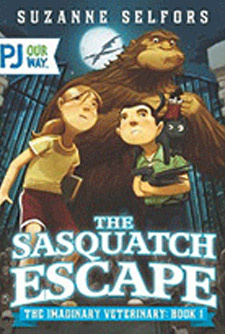Duck Dreams : City Boy to Farmer Boy
When Simon’s family moves to the country, it looks like his dream is about to become true! But farming’s not as easy as it looks, especially when you’ve got cheating chicken dealers, duck disasters, and a best friend who’s not acting like much of a friend at all.
Average Rating
( hint: Login to leave a review! )
62 Reviews
Leave Review
What the Book Is About
Jewish Content & Values
Positive Role Models
Content Advisory
Talk It Over
More for You
What the Book Is About
11-year-old Simon Hirsh wants to be a farmer more than anything, but his parents and uncles aren’t supportive. They live in a tenement in Boston, and Jews are supposed to be businessmen, not farmers. But after Simon’s younger brother Benny is almost injured by a carthorse on a busy street, their parents make the difficult decision to move away from their extended family in the city. Not long after they get to the country, Simon and Benny convince their parents to let them buy several hens – they plan to sell the eggs with the ultimate goal of buying a dairy cow. Simon faces a variety of challenges along the way, including a cheating chicken dealer, some serious duck drama, and a difficult new friendship with a young Irish boy from a poor family too proud to accept the help they need. But when Simon’s Aunt Rifka is finally able to make the trip over from the old country, it seems like he might be able to achieve his dream of becoming a farmer after all.
Jewish Content & Values
- Simon and his family have Shabbat dinner together each week, during which they light candles and bless wine and challah. The family celebrates Jewish holidays, including Hanukkah and Passover.
- Simon’s father makes sure to bring their mezuzah when the family moves to a new home.
- The family keeps kosher and buys their meat from a kosher butcher. Simon explains the basic rules of kashrut (Jewish dietary laws) to a new friend who isn’t Jewish.
- Papa and Mama speak Yiddish with family members and friends from the old country, and Cousin Joe takes a date to the Yiddish theater.
- Simon, Benny, and Aunt Rifka take good care of the animals, in accordance with the Jewish value of tza’ar ba’alei chayim, or minimizing the suffering of all living beings.
- Simon struggles to figure out how to best perform the mitzvah of helping a friend whose family doesn’t have enough money for heat and food.
- The book ends with a Jewish wedding officiated by a Rabbi under a chuppah. In addition, Simon and his younger brother have begun studying Hebrew in preparation for their bar mitzvahs.
- Undeterred by a variety of challenges and missteps, Simon proves to be a smart, creative, compassionate, and resilient boy who is willing to work hard to achieve his dream.
- Nine-year-old Benny cares deeply about the welfare of animals. He also finds a way to support his older brother while holding true to his own values and dreams.
- Simon’s parents and extended family are immigrants who have worked hard to create a new life and adopt modern American values while also holding true to their Jewish roots and values.
Content Advisory
Several ethnic slurs are used in the book. Simon’s new friend Patrick Keegan is referred to as “a big dumb Mick” and “shanty Irish,” and Simon hears anti-Semitic phrases such as “kike” and “Christ-killer.” At one point, Patrick gets angry at Simon and tells him “to keep your lousy Jew nose out of our business.”
Talk It Over
Benny is uncomfortable raising ducks that will be sold to a restaurant for food. Ultimately, he and Simon agree that they won’t keep any more animals that will be eaten, only chickens for eggs and a Jersey cow for milk. The laws of kashrut permit the killing of certain animals for food as long as the animals don’t suffer. What do you think about this? If you were a farmer, what kind of farm would you have and why?
Early in the book, Simon’s Uncle Herman asks, “Who ever heard of a Jewish farmer?” Herman isn’t wrong; one has to go back almost 2,000 years to find a time when Jews were a primarily agricultural people. By the 7th century, only 10-25% of the Jewish population worldwide worked the land. Many Jews left farming because they were prohibited from owning land, but economic historians Maristella Botticini and Zvi Eckstein argue that the high literacy rates in the Jewish community enabled Jews to leave the farming world for higher paying jobs. In 1900, the German Jewish philanthropist Baron de Hirsch founded The Jewish Agricultural Society in the United States with the goal of supporting Eastern European Jewish immigrants in founding collective and individual farms. More recently, farms and food justice organizations such as Adamah, Urban Adamah, Hazon, and Grow and Behold are bringing a new generations of Jews back to the land. Furthermore, for the many Zionist pioneers who arrived in Israel during the last century, farming was almost a holy endeavor. One of their major achievements was making the desert bloom. Today, Israeli agricultural innovations help to feed people all around the world.
What the Book Is About
What the Book Is About
11-year-old Simon Hirsh wants to be a farmer more than anything, but his parents and uncles aren’t supportive. They live in a tenement in Boston, and Jews are supposed to be businessmen, not farmers. But after Simon’s younger brother Benny is almost injured by a carthorse on a busy street, their parents make the difficult decision to move away from their extended family in the city. Not long after they get to the country, Simon and Benny convince their parents to let them buy several hens – they plan to sell the eggs with the ultimate goal of buying a dairy cow. Simon faces a variety of challenges along the way, including a cheating chicken dealer, some serious duck drama, and a difficult new friendship with a young Irish boy from a poor family too proud to accept the help they need. But when Simon’s Aunt Rifka is finally able to make the trip over from the old country, it seems like he might be able to achieve his dream of becoming a farmer after all.
Jewish Content & Values
Jewish Content & Values
- Simon and his family have Shabbat dinner together each week, during which they light candles and bless wine and challah. The family celebrates Jewish holidays, including Hanukkah and Passover.
- Simon’s father makes sure to bring their mezuzah when the family moves to a new home.
- The family keeps kosher and buys their meat from a kosher butcher. Simon explains the basic rules of kashrut (Jewish dietary laws) to a new friend who isn’t Jewish.
- Papa and Mama speak Yiddish with family members and friends from the old country, and Cousin Joe takes a date to the Yiddish theater.
- Simon, Benny, and Aunt Rifka take good care of the animals, in accordance with the Jewish value of tza’ar ba’alei chayim, or minimizing the suffering of all living beings.
- Simon struggles to figure out how to best perform the mitzvah of helping a friend whose family doesn’t have enough money for heat and food.
- The book ends with a Jewish wedding officiated by a Rabbi under a chuppah. In addition, Simon and his younger brother have begun studying Hebrew in preparation for their bar mitzvahs.
Positive Role Models
- Undeterred by a variety of challenges and missteps, Simon proves to be a smart, creative, compassionate, and resilient boy who is willing to work hard to achieve his dream.
- Nine-year-old Benny cares deeply about the welfare of animals. He also finds a way to support his older brother while holding true to his own values and dreams.
- Simon’s parents and extended family are immigrants who have worked hard to create a new life and adopt modern American values while also holding true to their Jewish roots and values.
Content Advisory
Content Advisory
Several ethnic slurs are used in the book. Simon’s new friend Patrick Keegan is referred to as “a big dumb Mick” and “shanty Irish,” and Simon hears anti-Semitic phrases such as “kike” and “Christ-killer.” At one point, Patrick gets angry at Simon and tells him “to keep your lousy Jew nose out of our business.”
Talk It Over
Talk It Over
Benny is uncomfortable raising ducks that will be sold to a restaurant for food. Ultimately, he and Simon agree that they won’t keep any more animals that will be eaten, only chickens for eggs and a Jersey cow for milk. The laws of kashrut permit the killing of certain animals for food as long as the animals don’t suffer. What do you think about this? If you were a farmer, what kind of farm would you have and why?
More for You
Early in the book, Simon’s Uncle Herman asks, “Who ever heard of a Jewish farmer?” Herman isn’t wrong; one has to go back almost 2,000 years to find a time when Jews were a primarily agricultural people. By the 7th century, only 10-25% of the Jewish population worldwide worked the land. Many Jews left farming because they were prohibited from owning land, but economic historians Maristella Botticini and Zvi Eckstein argue that the high literacy rates in the Jewish community enabled Jews to leave the farming world for higher paying jobs. In 1900, the German Jewish philanthropist Baron de Hirsch founded The Jewish Agricultural Society in the United States with the goal of supporting Eastern European Jewish immigrants in founding collective and individual farms. More recently, farms and food justice organizations such as Adamah, Urban Adamah, Hazon, and Grow and Behold are bringing a new generations of Jews back to the land. Furthermore, for the many Zionist pioneers who arrived in Israel during the last century, farming was almost a holy endeavor. One of their major achievements was making the desert bloom. Today, Israeli agricultural innovations help to feed people all around the world.





